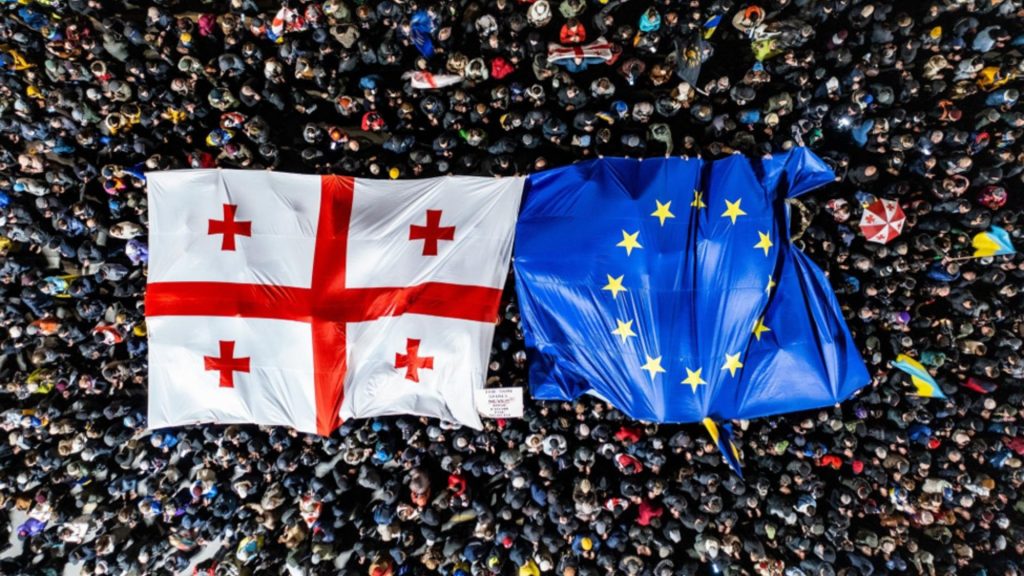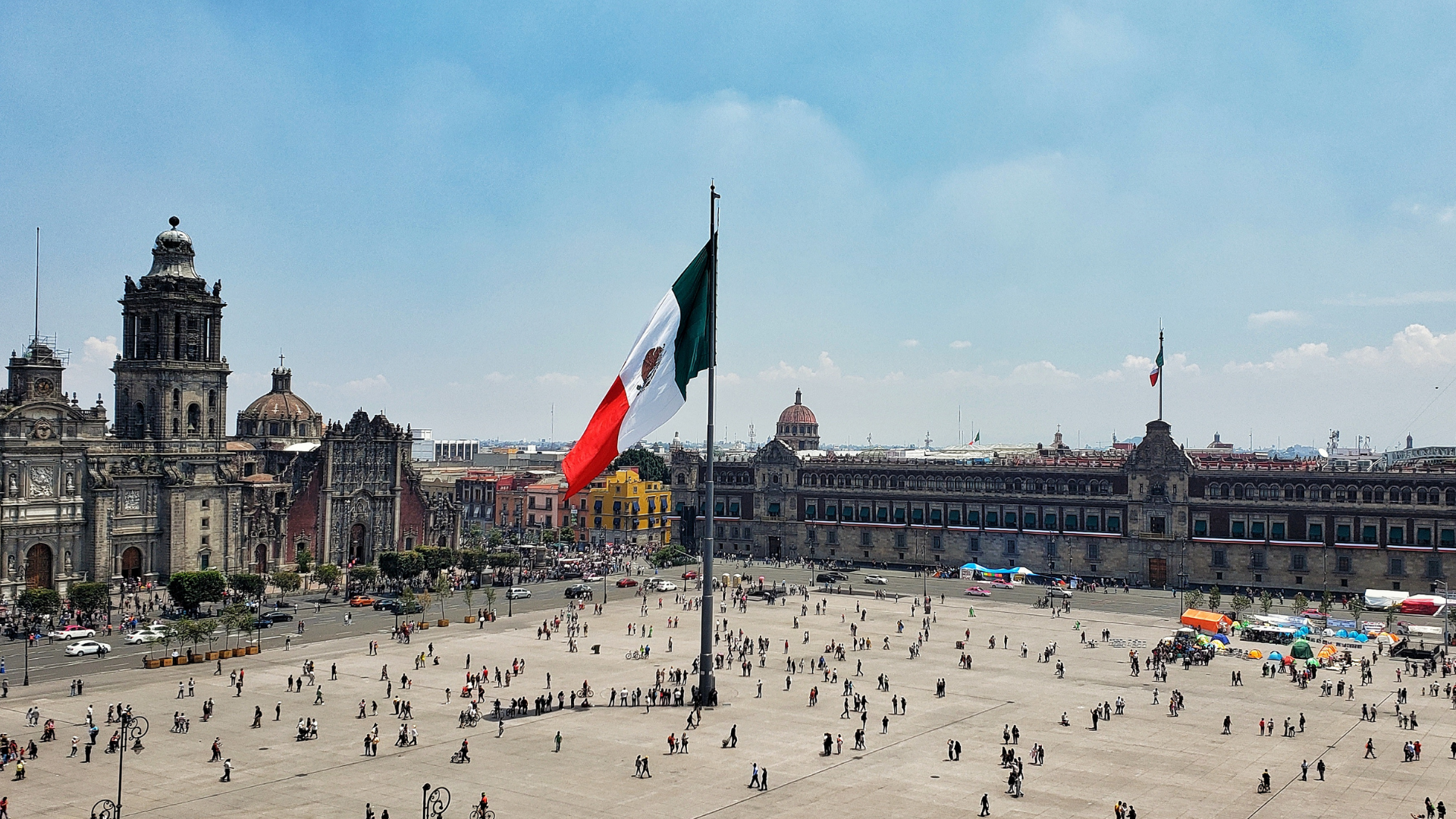March 7-8 (2023) protests in Tbilisi marked one of the milestones in Georgia’s recent history. Chanting “No to Russian Law,” tens of thousands of Georgians took to the streets in Tbilisi to stand and act against the first-reading adoption of the draft law on “Transparency of Foreign Influence,” which mirrored its Russian counterpart, intending to shrink space for civil society and jeopardise democracy, human rights and the rule of law.
Backed by the ruling Georgian Dream party, the draft law required civil society organisations and media, that received more than 20% of their funds (financial or in-kind support) from abroad, to register as “Foreign Agents” with the Ministry of Justice. Full of vague concepts and insufficiently defined terms, the draft law imposed fines up to 25,000 Georgian Lari (around 9, 800 USD) in the event of non-compliance with its terms (Human Rights Watch, 2023; Parulava, 2023). The initiators of the draft law, which was adopted in first reading, also registered another version of the bill on “Registration of Foreign Agents,” extending its scope to individuals and increasing its penalties up to 5 years of imprisonment. Even though the initiators and government attempted to deceive the public into believing that the sole goal of both bills was to ensure transparency of funds, it soon became evident that the proposed draft laws tacitly aimed to impose control and undue restrictions on independent groups that are at the forefront of securing human rights, democracy and the rule of law in the country.

Protesters in Tbilisi holding up the flags of Georgia and the EU | Photo by Ilia Samurganidi
The event sparked a large-scale wave of protests throughout Georgia, especially in the country’s capital. United against the oppressive law, demonstrators showed the highest degree of resistance, unity, coordination and self-organisation, which eventually paid off. Even though the government attempted to disperse protesters with riot police, tear gas and water cannons, the crowd proved to be extremely resilient. Following 2 days of non-stop mass protests, the parliament was pressured to schedule an extraordinary session, where the government voted down the draft law on “Transparency of Foreign Influence” (Kincha, 2023). In addition, the second bill on “Registration of Foreign Agents” was withdrawn.
The first-reading adoption of the draft law on “Transparency of Foreign Influence” has prompted not only internal but also strong external condemnation. The United Nations in Georgia (2023) expressed “profound concern,” stating that civil society organisations in the country have been taking a leading role in protecting human rights and supporting the most vulnerable communities. A high representative of the EU stressed the incompatibility of the draft law with EU values and added that its final enactment would have “serious repercussions” on EU-Georgia relations (EEAS Press Team, 2023). In her open letter, the Commissioner for Human Rights of the Council of Europe , Dunja Mijatović, pointed to the detrimental consequences of the proposed draft law on freedom of expression and association and urged the parliament to withdraw the law.
Incompatibility of “Foreign Agents” Law with Fundamental Human Rights
The case law within the jurisprudence of the European Court of Human Rights (ECHR) and the Court of Justice of the European Union (CJEU) affirm that the “Foreign Agents” law conflicts with fundamental human rights. In the case of Ecodefence and Others v. Russia (2022), the ECHR found Russian law on “Foreign Agents,” which closely resembled the Georgian bills (1,2), in violation of Article 11 of the European Convention on Human Rights, protecting freedom of assembly and association. The Court noted that the law is neither justified nor necessary in a democratic society, placing a “chilling effect” on the activities of civil society organisations (Eco Defence and Others v. Russia, 2022, para. 186). In the same vein, in the case of European Commission v. Hungary (2020), the CJEU held that the Hungarian law on the “Transparency of Organisations Receiving Foreign Funds” was contrary to the right to private life, protection of personal data and freedom of assembly and association. As a result, the Hungarian government was compelled to repeal the law (Hungary Today, 2021).
Lessons Learned from Russian “Foreign Agents” Legislation
Russia adopted its first “Foreign Agents” law in 2012, which took a toll on civil society organisations. By 2016, the government had designated 148 organisations as “Foreign Agents,” 27 of which, mostly those whose scope of work was centered on human rights, eventually ceased to exist (Amnesty International, 2016). Subsequent amendments widened the application of the law from registered civil society organisations to media, individuals and associations. In 2022, a new law entered into force that radically expanded Russia’s oppressive “Foreign Agents” legislation to virtually any entity or individual who, under “foreign influence,” pursues civil activism or is critical of Russian policies (Human Rights Watch, 2022). In the face of such an immensely hostile environment, many civil society organisations were shut down. In 2021 alone, 1,500 human rights defenders, activists and journalists fled the country (North Realities, 2021).
Since the proposed Foreign Agents draft laws in Georgia echoed the spirit of the Russian laws, one could reasonably assume that Georgian civil society and the human rights situation in the country would have been subjected to the same oppressive, dictatorial and authoritarian rule as they are in Russia, should the Georgian government have not faced unbreakable public backlash.
Concluding Discussion: The Power of Protests and Active Civil Society
March 7-8 (2023) protests in Georgia demonstrate that governments with authoritative tendencies often underestimate the power which lies with people when human rights and democratic values are endangered. The event has proved that the utilisation of the right to protest, which closely intersects with freedom of assembly, freedom of association and freedom of speech, is an indispensable tool to expose injustice, attract public support, generate and sustain political pressure and ultimately influence power structures’ decision-making processes. The resistance, high level of self-organisation and scale of the protests compelled the government of Georgia to realise that civil society forms the very foundation of a public domain and participatory governance.
In spite of the failure of the Georgian government to silence civil society, the hostile environment in the country towards civil society organisations, human rights defenders, media and activists is a systemic issue that cannot be eradicated with a single case of success. The proposal and/or enactment of Russian-styled oppressive laws is an extremely dangerous trend that requires high levels of scrutiny, vigilance and coordination from civil society and the larger public. This is particularly vital now, as Georgia is at the critical stage of its euro integration process – with 81% of Georgia’s population willing to join the EU (National Democracy Initiative, 2023), Georgia is expected to fulfill the recommendations given by the European Commission (2022) in order to obtain an EU candidate status. As human rights, democracy and the rule of law form an integral part of the Commission’s recommendations, the Georgian government shall acknowledge that any law, policy, or initiative that undermines these values will be met with high criticism and opposition from the public.
Bibliography
Amnesty International. (2016). Russia: Four years of Putin’s ‘Foreign Agents’ law to shackle and silence NGOs. https://www.amnesty.org/en/latest/press-release/2016/11/russia-four-years-of-putins-foreign-agents-law-to-shackle-and-silence-ngos/
Ecodefence and Others v. Russia, nos. 9988/13 and 60 others, European Court of Human Rights 2022. https://hudoc.echr.coe.int/fre#{%22itemid%22:[%22001-217751%22]}
European External Action Service (EEAS) Press Team. (2023). Georgia: Statement by the High Representative on the adoption of the “foreign influence” law. https://www.eeas.europa.eu/eeas/georgia-statement-high-representative-adoption-%E2%80%9Cforeign-influence%E2%80%9D-law_en
European Commission v. Hungary, C‑78/18, Court of Justice of the European Union 2020. https://curia.europa.eu/juris/document/document.jsf?text=&docid=227569&pageIndex=0&doclang=EN&mode=lst&dir=&occ=first&part=1&cid=4209735
European Commission. (2022). Opinion on the EU membership application by Georgia. Brussels. https://ec.europa.eu/commission/presscorner/api/files/document/print/en/qanda_22_3800/QANDA_22_3800_EN.pdf
Human Rights Watch. (2022). Russia: New Restrictions for ‘Foreign Agents’. https://www.hrw.org/news/2022/12/01/russia-new-restrictions-foreign-agents
Human Rights Watch. (2023). Georgia: ‘Foreign Agents’ Bill Tramples on Rights. https://www.hrw.org/news/2023/03/07/georgia-foreign-agents-bill-tramples-rights
Hungary Today. (2021). Government Revokes Controversial NGO Law. https://hungarytoday.hu/government-fidesz-orban-ngo-civil-org-law-foreign-funded-soros/
Kincha, Sh. (2023). Georgian Dream formally kill foreign agent draft law. OC Media. https://oc-media.org/georgian-dream-kill-foreign-agent-draft-law/
Mijatović, D. (2023). [Open letter to mr. Shalva Papuashvili, the Chairman of the Parliament of Georgia]. https://rm.coe.int/commhr-2023-5-letter-to-the-chairman-of-the-georgian-parliament-by-dun/1680aa5eba
National Democracy Initiative. (2023). Taking Georgians’ pulse: Findings from December 2022 face to face survey. https://www.ndi.org/sites/default/files/NDI%20Georgia_December%202022%20poll_public%20version_ENG_vf.pdf
United Nations in Georgia. (2023). Statement of the United Nations in Georgia on the draft Law on Transparency of Foreign Influence. https://www.undp.org/georgia/news/un-statement-on-draft-law-on-transparency-of-foreign-influence
Parulava, D. (2023). ‘Over my dead body’: How Georgian protesters beat a Russian-style legal threat to their freedoms. Politico. https://www.politico.eu/article/georgia-protest-russia-bill-freedoms-tbilisi-nato-eu/

